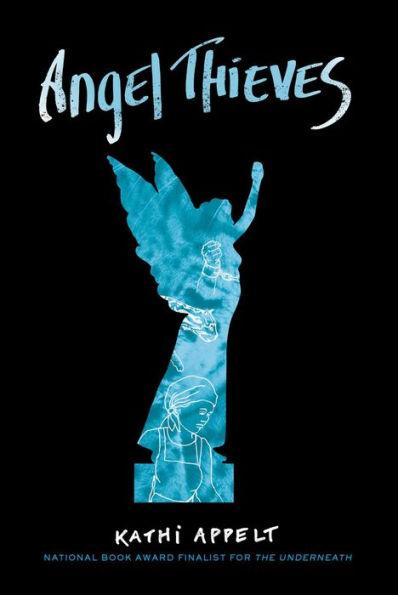
YA FICTION
Kathi Appelt
Angel Thieves
Atheneum/Caitlyn Dlouhy Books
Hardcover, 978-1-4424-2109-7, (also available as an e-book and an audiobook), 336 pgs., $18.99
March 12, 2019
Angel Thieves is a striking depiction of familial devotion, the harsh cry for freedom, and tender new love. In this beautiful novel, the Buffalo Bayou in the Houston area is the watery thread that connects the seemingly disparate narratives throughout. As the stories unfold, they begin to gently flow and intertwine even though they are separated by time, culture, and indescribable heartache.
At the core is the modern story of young Cade and his father, Paul, and Cade’s classmate Soleil Broussard, who is drawn into Cade’s orbit as he is into hers. This modern drama is skillfully joined with the past narrative of a young slave and her two daughters who are searching for the stone angel along the bayou that will guide them to freedom. Dropped into the modern mix is an entrapped ocelot, harshly and viscerally representing the very heart of the story: Freedom. Angel Thieves is a multi-faceted journey that hinges on that desperate plea for freedom: freedom to choose the difficult path and raise a child alone, freedom from the misery of a small cage, freedom from broken promises and an evil world, and freedom to see a miracle in something as unassuming as a honey-bear jar.
Paul and Cade are the angel thieves. Right or wrong, they are noble and exquisite in their thievery as a means of survival. The stone angels standing sentinel in forgotten cemeteries have served their dead well, but their work is far from over. And perhaps even stone angels need to be unmoored and set free.
The legendary stone angel that eludes Cade and Pete was carved by a young slave in the 1800s. His trademark design has his angels with one hand open and the other closed. This extraordinary stance can be interpreted in many ways but fitting to the overall story is the idea of the fist representing the close-minded evil of greed, hate, and captivity, and the open hand representing mercy, hope, and ultimate love. No matter the interpretation, the angel surely embodies the dualities of behavior between good and evil, choice between right and wrong, and tendency between love and hate.
Even with the narratives’ intricate back-and-forth motion, Angel Thieves is not a difficult story to embrace and appreciate. The author’s ability to paint a complete picture by smoothly interlocking the pieces is exceptional and satisfying.
The writing style is fluid and lyrical, with the interconnecting stories ebbing and flowing, mimicking the winding Buffalo Bayou as it swells and consumes untold treasures and then parcels out its benevolence as it sees fit. Angel Thieves is a literary Texas jewel that tantalizes with its unusual construction, fascinates with its symbolism and imagery, and encourages deep thought on humankind’s motivation either to help others in need or ignore them or even submerge them deeper into despair. Because sometimes, those who struggle to survive and be free have no one else except an angel, a bayou, and a kind person with an unselfish heart.
Kathi Appelt is the author of the Newbery Honoree, National Book Award finalist, PEN USA Literary Award-winning, and bestselling The Underneath as well as the National Book Award finalist The True Blue Scouts of Sugar Man Swamp, Keeper, and many picture books including Counting Crows. She has two grown children and lives in College Station, Texas, with her husband. Visit her website.
